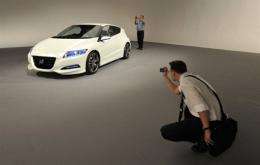Japanese auto firm Honda Motors preview a hybrid vehicle prior to the Tokyo Motor Show. Futuristic concept cars, ultra-efficient hybrids, zero-emission electric vehicles and even a hydrogen-powered scooter have jostled for the limelight as the capital city's major motoring event kicked off.
Futuristic concept cars, plug-in hybrids, zero-emission electric vehicles and even a hydrogen-powered scooter jostled for the limelight as the Tokyo Motor Show kicked off on Wednesday.
From a super-skinny Nissan electric car that leans when going around bends, to a lightweight Toyota sports car and a Daihatsu vehicle with a design based on a basket, Japanese makers showed off their visions of the future.
While hybrids are still a big feature, electric cars are competing for attention at this year's show as technological breakthroughs in rechargeable batteries bring mass-produced zero emission cars closer to reality.
Foreign makers are almost entirely absent at this year's show, now dominated by the Japanese makers, which are pinning their hopes on growing interest in fuel-efficient automobiles to rescue them from a brutal industry slump.
Toyota, which has said it aims to launch an electric car by 2012, took the wraps off a new version of its battery-powered electric concept car, the FT-EV II, as well as a Prius plug-in hybrid.
"Toyota is not limiting itself to gasoline-electric hybrid vehicles. The era of reinventing the automobile is nearly upon us," said Akio Toyoda, president of the world's largest automaker.
Toyota also showed off a lightweight concept sports car inspired by an iconic 1980s coupe, along with a Lexus two-seat supercar with a 4.8-litre engine and a price of 375,000 dollars, of which just 500 will be produced worldwide.
Nissan unveiled a concept car that leans to the side when going around bends. Just 1.1 metres (3 feet 7 inches) wide, the "Land Glider" seats two people -- one in the front and one in the back.
Inspired by motorbikes and glider aircraft, it has tilting wheels that enable it to lean by up to 17 degrees. Japan's number three automaker hopes to start selling the car if there is enough interest.
It will also put its Leaf plug-in electric car on public display for the first time at the show, which opens to general visitors near Tokyo on Saturday and runs until November 4. The mid-sized car will go on sale in late 2010.
"Leaf will make waves in our industry as the world's first affordable zero-emission car," Nissan chief executive Carlos Ghosn said.
"The time is now for zero emissions. Sustainable mobility is within our reach. We stand on the threshold of a new era in the automotive industry."
From Honda comes the EV-N, a cute new electric concept car with a retro look that can store a one-wheel personal mobility device inside its door.
The high cost of rechargeable batteries has long been a barrier to the launch of affordable electric vehicles, but after technological advances the dawn of zero-emission vehicles appears to be approaching.
"Hybrids have disadvantages -- they are heavy, have a complicated system and still use gasoline," said Tatsuya Mizuno, director of Mizuno Credit Advisory, an independent consulting firm.
"Electric cars have a more simple system and are lighter and emit no CO2. If they can resolve the problem of production costs, electric cars have many more advantages than hybrids," he said.
Fuel-cell cars, which run on hydrogen and emit only water, also make an appearance at the Tokyo show. There is even a fuel-cell scooter and a fuel-cell wheelchair from Suzuki.
Proponents of hydrogen-powered vehicles argue they are the only true zero emission technology because fossil fuels are often burned to generate electricity, particularly in emerging nations like China and India.
While the high production costs of fuel-cell vehicles pose a significant obstacle, some think they may eventually overtake plug-in electric cars.
"We believe that the fuel-cell electric vehicle will be the ultimate form for automobiles in the future," said Honda president Takanobu Ito.
(c) 2009 AFP
























